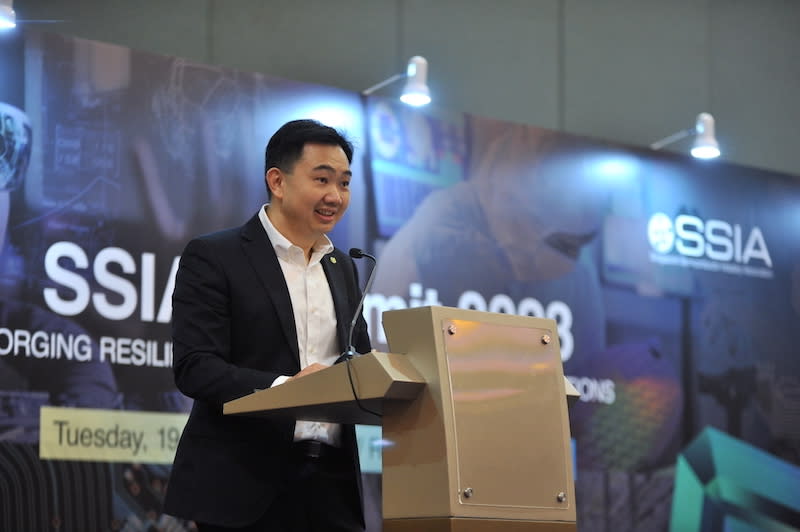Singapore Semiconductor Industry Association (SSIA) reaffirms commitment to cooperation

Singapore Semiconductor Industry Association (SSIA) reaffirms commitment to cooperating with industry leaders.
On Sept 19, the Singapore Semiconductor Industry Association (SSIA) reaffirmed its commitment to working with industry leaders and government agencies to build a sustainable and resilient supply chain for the global semiconductor ecosystem, supported by the Singapore Economic Development Board (EDB) at this year’s iteration of the annual SSIA Summit.
Today, the sector continues to grow impressively amidst macro headwinds, as Singapore’s semiconductor output experienced a robust 5.8% y-o-y growth, contributing significantly to the country's overall manufacturing output in July.
Forecasts predict that the global semiconductor industry is on-track to double its revenues, reaching US$ 1 trillion ($1.3 trillion) by 2030.
The SSIA Summit is renowned for bringing together industry leaders, experts, and enthusiasts to discuss the most recent mega trends and critical topics affecting the semiconductor landscape.
This year’s summit was hosted under the theme of “Forging Resilience: navigating supply chain disruptions,” which aimed to address the importance of the semiconductor industry to the digital world and the considerable challenges faced due to supply chain disruptions, which have been exacerbated by recent global events.
Dialogue conducted at the summit was targeted at examining how vulnerabilities within current supply chain models could be strengthened and future-proofed collectively.
Executive director of SSIA, Ang Wee Seng highlighted the growing importance of cooperation between countries to foster a healthy environment for the semiconductor industry.
“In today’s world of economic uncertainties and frequent supply chain disruptions, the need for countries to collaborate collectively has never been more pressing.,” says Ang.
He adds: “This necessitates open dialogues, cooperation among industry leaders, the adoption of fair trade practices and consistent investment in research and development. Moreover, governments across the world must work together implementing policies to encourage domestic production, or more importantly, fair international trade.”
Over the last five decades, Singapore’s semiconductor industry has evolved significantly, guided by three core pillars: Growing & Developing Workforce, Strengthening and Growing the Local Ecosystem, and Towards Sustainability.
Its semiconductor workforce has shifted from precision skills to adaptable expertise, emphasising upskilling and preparing for opportunities in the Industry 4.0 era.
The ecosystem has also expanded, attracting global players including Applied Materials, Analog Devices, ASM, GlobalFoundries, Soitec and amongst others, to establish their presence in Singapore, and solidifying the country’s position as a regional semiconductor hub.
Furthermore, to achieve sustainability goals and align with international standards, manufacturing processes at fabs have transformed to reduce environmental impact while boosting productivity.
Apart from keynote speaker sessions by a diverse group of industry leaders from consultancy to global semiconductor companies, the summit also featured a panel discussion which delved into the realm of semiconductor supply chain resiliency, shedding light on the current challenges and exploring potential solutions within the industry.
One of the discussions’s key highlights was the exploration of how the semiconductor industry could draw inspiration from other sectors and leverage cutting-edge technology to enhance its supply chain resiliency.
The dialogue dove into a discourse about the strategic use of digital tools, advanced analytics, and automation, underscoring how these innovations can be harnessed to fortify the industry against disruptions.
Senior vice president of ASEAN digital industries at Siemens, Isabel Chong, comments: “Digitalisation is integral to safeguarding supply chains from the effects of both predictable and unpredictable events. Data-driven intelligence provides a solid foundation for making timely and effective decisions that are not only more resilient, but also strong enough to address unexpected events with greater ease.”
Also present at the summit's dinner was guest-of-honour and Minister for Trade and Industry, Gan Kim Yong.
"Over the past 55 years, the Singapore government has built deep partnerships with the semiconductor industry. Through trade associations such as SSIA, the industry has built a robust community that proactively works with each other to address shared industry needs. Such an entrepreneurial spirit is what brought the industry to where it is today, and will be what fuels future growth, as we leverage the opportunities in talent development and sustainability," says Gan.
See Also:
Click here to stay updated with the Latest Business & Investment News in Singapore
Baidu and Alibaba spearheading China’s AI charge, but chip curbs to hurt: Morningstar
Silicon Box opens $2 billion advanced semiconductor manufacturing factory in Singapore
Get in-depth insights from our expert contributors, and dive into financial and economic trends

 Yahoo Finance
Yahoo Finance 